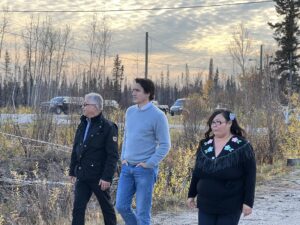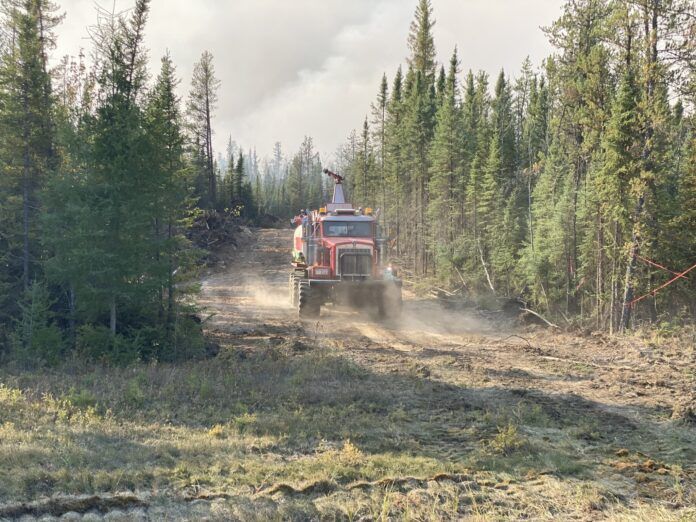The Ministry of Natural Resources announced $12.1 million will go to projects across the country to combat extreme weather, with over $7 million coming to the far North.
The Honourable Jonathan Wilkinson, the Honourable Gary Anandasangaree, the Honourable Terry Duguid, the Honourable Steven Guilbeault, Member of Parliament Michael McLeod and Member of Parliament Brendan Hanley announced on March 20 that the funding will go to 13 projects under Natural Resources Canada’s Climate Change Adaptation Program and the Climate-Resilient Coastal Communities Program. The newly announced funding is part of over $46 million for 63 projects run through both of these programs in support of the National Adaptation Strategy.
In the announcement, N.W.T. PM Michael McLeod emphasized that investments like these will go a long way to help protect coastal communities of the North, who are on the “front lines of climate change.”
“Through these investments, our government is demonstrating our commitment to local projects that will help keep our residents secure and our communities well-prepared,” he said.

Joanna Eyquem, who is the Vice President of the Climate Risk Institute, urged that coastal hazards like flooding and erosion are evolving in Canada.
The Honourable Vince McKay. N.W.T. Minister of Municipal and Community Affairs, said the government is taking care to support the NWT’s four coastal communities — Tuktoyaktuk, Paulatuk, Sachs Harbour and Ulukhaktok.
“These four communities are facing growing risks from coastal erosion, sea level rise, storm surges and permafrost thaw due to climate change. This multi-year project will provide tools, resources and guidance to help communities develop and implement their own climate adaptation measures, including planned relocation efforts. The GNWT will work in partnership with community governments to ensure adaptation strategies are community-led, practical and support long-term climate resilience,” he said.
The Honourable Gary Anandasangaree Minister of Crown-Indigenous Relations and Northern Affairs acknowledged climate change carries particular concerns for people of the North, including Indigenous communities.
“Canada’s northern and Arctic regions are warming at approximately three times the global average. The impacts are being felt in Indigenous and northern communities that find themselves on the front lines due to their geographic location and relationship to the land, waters and ice. I am proud to join my federal colleagues in making this important announcement supporting communities to adapt to a changing climate to help protect their livelihoods, infrastructure, culture and way of life,” he said in the announcement.
The Honourable Terry Duguid, Minister of Environment and Climate Change also affirmed that communities of the North face particular challenges when it comes to climate change.
“Climate change is no longer a distant threat — it is a present reality that communities across Canada, particularly in the North, are grappling with every day. From rising sea levels to permafrost thaw, the effects are profound and demand urgent action,” said the minister.
Minister Wilkinson explained that the federal government is acting now to help communities “prepare for and protect against the threat of climate change,” and its impact on everything from groceries to insurance costs.
“The impacts associated with climate change — including intense wildfires, devastating floods, stronger tropical storms and hurricanes, and permafrost thaw in the north — are being felt environmentally and economically in every single region of Canada,” said the minister.
In their statement, the Ministry of Natural Resources acknowledged the potential dangers of climate change for communities across the country.
The Ministry urged that investing in long-term resilience will help offset the affects of extreme weather events for communities in the North and across Canada, including Indigenous communities.
“Some projects will also work with rural, remote and Indigenous communities; First Nations; and stakeholders to facilitate knowledge sharing and develop adaptation actions and pathways,” the Ministry said.
Manisha Singh of Nı́o Nę P’ęnę́ Research Manager, Ɂehdzo Got’ı̨nę Gots’ę́ Nákedı (Sahtú Renewable Resources Board), affirmed the importance of continuing community efforts in the region.
“As climate change intensifies, particularly with rising temperatures and thawing permafrost, our project is vital for assessing the risks of sump failure in the Sahtú region. By collaborating with Sahtú communities, the Ɂehdzo Got’ı̨nę Gots’ę́ Nákedı (Sahtú Renewable Resources Board) is not only developing comprehensive land reclamation and safe land-use guidance but also ensuring that Indigenous knowledge and expertise are integral to the process. This collaborative effort will help build long-term resilience and safeguard the land for future generations.” said Singh.
Canada has invested more than $6.5 billion in adaptation efforts since 2015, but the costs of climate change are mounting.
As the Honourable Steven Guilbeault, Minister of Canadian Culture and Identity pointed out 2024 was a record year for climate change, seeing $8 billion in insured damages from natural disasters.
MP McLeod shared news of the funding on social media.
“Today, our government announced over $4.1M in funding to support four projects to support climate change adaptation in the NWT,” he announced in a March 21 Facebook post.
McLeod said that of the $12.1 M in total federal funding, $2.6M will be implemented towards climate resilience measures in Tuktoyaktuk, Paulatuk, Ulukhaktok, and Sachs Harbour.
Another $687K will go towards increasing the workforce capacity through climate adaptation and preparedness training, he said. An additional $466K will be put towards increasing climate change adaptation knowledge and capacity through a climate change risk assessment of the Giant Mine Remediation Project.
To boot, another $354K will support the development of land reclamation guidance aimed at re-establishing safe conditions for land use by the Sahtú Dene and Métis communities, said MP McLeod.
Marie Martin, who is the Senior Communications Advisor with Natural Resources Canada, told True North FM that a total of $7,363,491 will go to seven different projects located in the far North.
Martin added that one additional project located in the north, which is being led by the Mushkegowuk Council in the Hudson Bay-James Bay lowland region, will receive $750,000 in federal funding.





